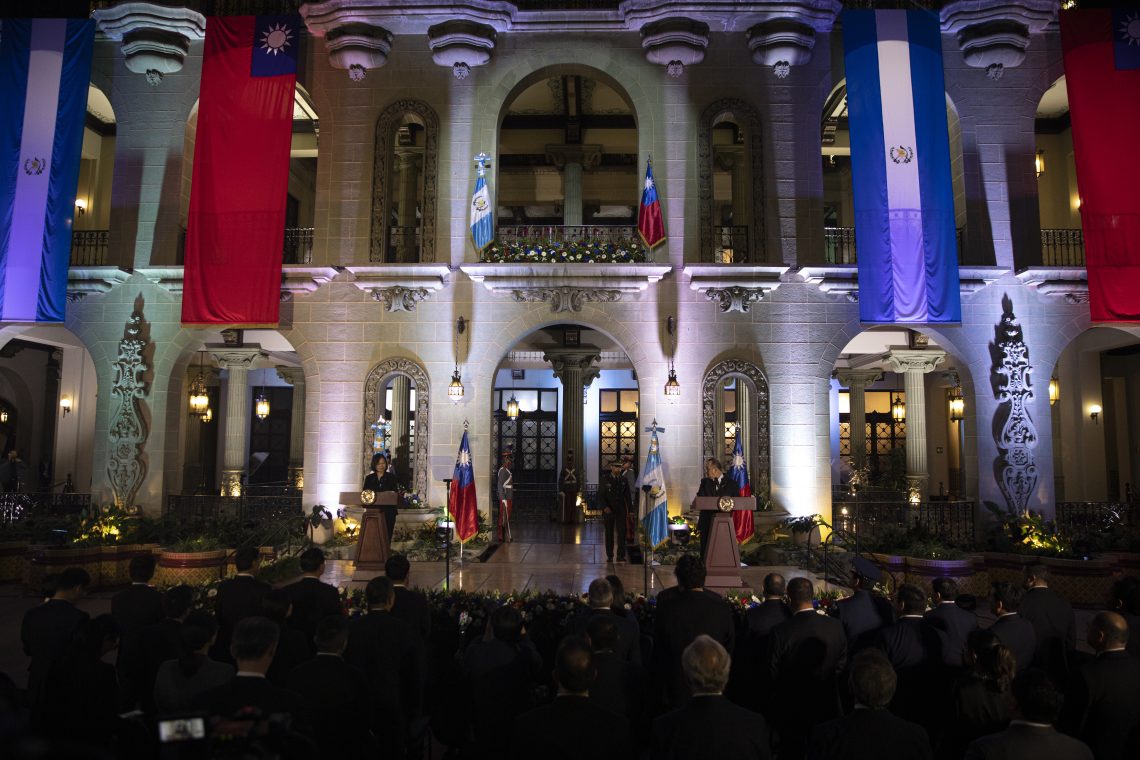Latin America’s role in Taiwan’s existential struggle
As Taipei’s diplomatic reach in Latin America wanes, China and the U.S. vie for strategic influence.

In a nutshell
- Countries recognizing Taiwan are steadily fewer due to Chinese influence
- Taipei’s informal relations worldwide are crucial for its survival
- U.S. hemispheric sovereignty is challenged by Chinese investments
Tensions in the Taiwan Strait are set to grow in the coming years as Beijing pursues an aggressive strategy of coercion in the Indo-Pacific, and the ramifications are far-reaching. This comes as the United States and China vie for influence globally, including in the Americas. Their competition, however, lays bare the risks and limits each country faces, and is forcing them to find ways to mitigate economic and strategic vulnerabilities.
When examining Taiwan’s diplomatic strategy, it is helpful to distinguish between its formal and informal ties. Taipei has steadily been losing formal partners. Over the last five years, the number of states in Latin America engaging Taiwan has decisively narrowed, with Honduras, Nicaragua and El Salvador severing ties. Currently, only Belize, Guatemala, Haiti, Paraguay and the small Caribbean countries of Saint Lucia, Saint Kitts and Nevis, and Saint Vincent and the Grenadines recognize Taiwan.
Facts & figures
Taiwan’s 12 diplomatic allies

Yet while the number of its global diplomatic allies decreases, Taiwan, its people and enterprises have been expanding their network of unofficial partnerships with Western democracies and multilateral institutions. This networking strategy is predicated on the inevitability that, under pressure from Beijing, Taiwan may lose many, if not all, of its formal diplomatic allies. This will lead to a new era where Taiwan’s unofficial network of relationships will be the defining feature of its global security and economic prosperity. And as many of Taiwan’s remaining diplomatic allies are located in Latin America, the region will remain a key focus for both American and Chinese policymakers.
Latin America’s conundrum
For the U.S., defending Taiwan’s diplomatic allies in the Western Hemisphere is an imperative. It needs Latin America to shore up vulnerabilities in its supply chains. The lessons of the Covid-19 pandemic have reinforced the notion among U.S. and Western policymakers that they cannot let adversarial nations control key sectors and industries. Given Latin America’s geographic proximity to the U.S. and America’s longstanding economic and diplomatic ties there, with 11 active free trade agreements, defending the region’s sovereignty against the expansion of malign Chinese influence is both logical and necessary. Yet Washington has been slow to capitalize on the nearby region to strengthen its supply chains and leverage existing trade relationships.
Read more on the Americas
- A new Monroe Doctrine for the Western Hemisphere?
- Central America’s dysfunction grinds on
- Nicolas Maduro strengthens his hold over Venezuela
China, meanwhile, has a strategy for South and Central America and the Chinese Communist Party is moving full steam ahead with its implementation. Beijing views Latin America as key to its broader strategy to expand Chinese influence globally and promote a multipolar world order. The CCP’s interest in Latin America is primarily economic; resource-hungry China has tapped into the commodity-rich region to secure a steady stream of critical minerals and food products. Conversely, Latin American economies have developed an appetite for competitively priced Chinese goods and products.
Scenarios
Which of Taiwan’s Latin American diplomatic allies could soon sever ties?
It is critical to consider which Latin American nations that currently still maintain formal diplomatic ties with Taiwan may choose to sever them, and what that could mean. This is especially pertinent as Latin America remains a region of strategic importance in a potential U.S.-China conflict over Taiwan. Guatemala, Haiti and Paraguay are relevant cases worthy of consideration.
Paraguay: High likelihood of cutting ties with Taiwan in the near future
Paraguay and Taiwan have shared diplomatic relations for over 70 years. However, there is a high likelihood that this relationship will soon change. Paraguay, a landlocked country between Argentina, Brazil and Bolivia that is rich in natural resources, remains one of the poorest countries in Latin America. Its national poverty rate averages nearly 25 percent and that rate rises in rural areas. While the country has experienced economic gains in recent years, poverty remains a persistent problem.
The South American country’s economy is increasingly reliant on agricultural exports, namely soy and beef. Unlike regional beef production powerhouses like Brazil and Uruguay, Paraguay has been unable to export its beef to the U.S. since 1997 and faces a de facto embargo by China, which is often customary for Taiwan’s diplomatic allies. Despite the U.S. Department of Agriculture publishing a rule to authorize the importation of beef from Paraguay in 2023, the U.S. Senate vetoed the move and overwhelmingly voted to block Paraguayan beef. While the U.S. House of Representatives has not passed the Senate-led measure, bipartisan support for blocking the imports with backing by key U.S. agriculture associations all but guarantee that Paraguayan beef will not enter American markets. Regardless of the outcome of the upcoming U.S. election, this dynamic is unlikely to change. Both Democratic and Republican parties, to varying degrees, view protectionist measures as necessary to protect American industries from displacement by foreign competitors.
Additionally, Taiwan has been unable to match China’s largesse with Latin American countries. For example, from 2010 to 2019, China’s annual investments in Latin America were valued at $14 billion, with nearly none going to Paraguay. Taiwan’s aid to Paraguay averages about $150 million every five years. At some point, the potential economic benefits from receiving Chinese investments will prove too much for the impoverished nation to refuse, and Paraguay will likely sever ties with Taiwan in favor of expanded cooperation with the CCP. The Paraguayan soy sector is the third largest in the world and the beef industry is global player. It will be increasingly difficult to continue missing out on the Chinese market.
Guatemala: Low likelihood but ties with Taiwan are on delicate ground
Following El Salvador’s 2018 and Honduras’s 2023 decisions to sever ties with Taiwan, Guatemala remains the only country in Central America’s Northern Triangle to maintain diplomatic relations with Taipei.
For the first time in decades, Guatemala in 2023 elected a left-leaning president, Bernardo Arevalo, who, despite garnering 58 percent of the vote, is governing with an opposition-controlled legislature. While Mr. Arevalo has made numerous public declarations in favor of Guatemala’s continued formal relations with Taiwan, including meeting with recently inaugurated Taiwanese President Lai Ching-te, his administration has also stated that it intends to explore trade ties with China. Simultaneously, President Bernardo Arevalo is focused on strengthening ties with the U.S., where officials have undoubtedly communicated their desire to see Guatemala retain diplomatic ties with Taiwan.
Given these factors, there is a low likelihood of Guatemala severing ties in the near future. However, conditions are not static and dynamics are in flux. For example, President Arevalo could decide to break ties with Taiwan should he require additional funds, which the CCP could more easily provide, for political projects that remain underfunded by the opposition-controlled legislature. Alternatively, China’s desire for a strategic position in the northernmost country in Central America could incentivize Beijing to provide a uniquely attractive development package that Guatemala City would be hard-pressed to forgo.
Haiti: Poverty and crime keep China at a distance
Haiti has the unfortunate distinction of being the most impoverished economy in the Americas, with violence and natural disasters plaguing the country for much of its modern existence. The island nation has a weak and largely ineffective government, which fosters an environment where corruption flourishes. Regardless of its recognition of Taiwan, these same factors that could potentially lead Port-au-Prince to seek Chinese support are the very reasons why China has avoided aggressively courting Haiti.
The country has seen an intermittent presence of United Nations personnel and other international actors attempting to work toward stabilization. China uses its leadership role within the UN to promote its broader foreign policy objectives and is undoubtedly biding its time for ideal conditions before focusing on the impoverished and violence-torn country in the Caribbean Sea. It is worth noting that Haiti’s geographic proximity to the U.S. and its mineral and gas deposits are attractive assets to Beijing. Nevertheless, circumstances in Haiti are decades away from stabilizing, largely due to gang violence and ongoing political strife and criminal disputes. As such, there does not appear to be an impetus in the near to mid term for Port-au-Prince to sever ties with Taipei.
For industry-specific scenarios and bespoke geopolitical intelligence, contact us and we will provide you with more information about our advisory services.









